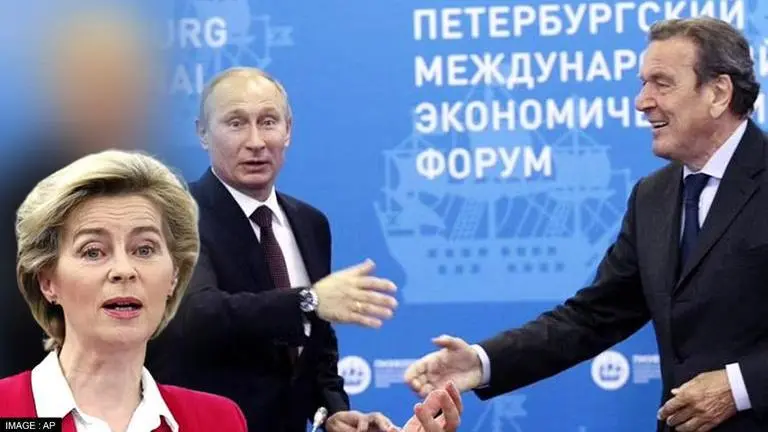Updated 20 May 2022 at 13:48 IST
EU under pressure to sanction ex-German Chancellor Schroder & others over Russian ties
On May 19, the European Parliament voted on a resolution encouraging the EU to penalise Europeans who remain on the boards of major Russian companies.
- World News
- 3 min read

On May 19, the European Parliament voted a resolution encouraging the EU to penalise Europeans who remain on the boards of major Russian companies. The resolution was clearly aimed at former German Chancellor Gerhard Schroder and Austria's ex-Foreign Minister Karin Kneissl. The resolution, which was passed by a show of hands, applauds the EU's "legitimate sanctions" against Russia while urging it to go further.
It urges the EU to expand the list of individuals targeted by EU sanctions to European members of large Russian company boards of directors and politicians who continue to receive Russian money. Despite pursuing significant swaths of the Russian economy and freezing scores of Russian assets abroad, the EU has so far avoided such a move.
Regardless of the fact that Schroder and Kneissl are not named in the text, the proposal is clear about who it is targeting. The resolution calls on high-profile Europeans to follow in the footsteps of previous European leaders Wolfgang Schussel of Austria, Esko Aho of Finland, and Francois Fillon of France, who all resigned from top positions at Russian enterprises following Moscow's invasion of Ukraine.
Meanwhile, Schroder and Kneissl have emerged as public instances of national politicians who have remained in lucrative jobs with Russian enterprises even as the EU pressures the Kremlin with sanctions against its military offensive in Ukraine. Schroder, who served as German chancellor from 1998 to 2005, has faced pressure to resign from his positions with Russian energy corporations and publicly oppose Russian President Vladimir Putin, which he has refused to do.
Advertisement
Schroder & Kneissl's strong ties with Russian federation
The German politician has strong ties to Moscow dating back to his tenure as chancellor. Notably, just weeks after leaving office, Schroder was chosen board chair of Nord Stream, the corporation in charge of the controversial gas pipeline between Russia and Germany. Last month, Schroder sparked new outrage by telling the New York Times that he doesn't "do mea culpa" and dismissing claims that Putin was behind the slaughter of Ukrainians in Bucha, near Kyiv.
On the other hand, Kneissl, who received backlash after inviting Putin to her wedding in 2018, joined the board of directors of Russian state oil firm Rosneft last year and has yet to resign. Officials from the European Parliament said the final text was the result of a compromise between the centre-right European People's Party, the Parliament's largest political party, and three other political parties, including the centre-left Socialists and Democrats (S&D), which includes Schröder's SPD.
Advertisement
In addition, the resolution also calls on the EU to censure a list of 6,000 Russians issued by the Anti-Corruption Foundation, a group formed by jailed Russian opposition leader Alexei Navalny, which includes MPs and government officials.
(With agency inputs, Image: AP)
Published By : Aparna Shandilya
Published On: 20 May 2022 at 13:47 IST
